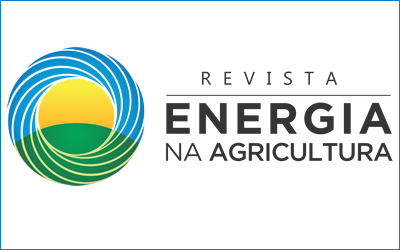AVALIAÇÃO ENERGÉTICA E ECONÔMICA DO AGROECOSSISTEMA ALGODÃO: UMA ABORDAGEM ENTRE SISTEMAS FAMILIARES DE PRODUÇÃO DO PARAGUAI E BRASIL
DOI:
https://doi.org/10.17224/EnergAgric.2011v26n3p98-117Resumo
O presente trabalho objetivou avaliar os índices de eficiência energética e econômica por unidade de área do agroecossistema algodão em sistemas de produção familiares do Paraguai e Brasil e estabelecer a relação entre as abordagens energéticas e econômicas. Considerou-se tipologias apresentadas pelo Programa de Apoio ao Desenvolvimento de Pequenas Explorações Algodoeiras (Paraguai) e o Programa Nacional de Fortalecimento da Agricultura Familiar (Brasil). Foram identificados sistemas familiares do Paraguai (San Juan-CA) e do Brasil (Leme-SP). Tanto na construção da estrutura de dispêndios energéticos como na avaliação da eficiência econômica do agroecossistema algodão, considerou-se os valores médios obtidos, em função dos agricultores apresentarem semelhança em termos de sistemas produtivos e estarem dentro da tipificação proposta neste trabalho. A partir dos itinerários técnicos observados verificou-se que o agroecossistema paraguaio dependeu fundamentalmente de fonte fóssil, (óleo diesel 56,76%) e de fonte industrial (35,99%). Igualmente, estabeleceu-se o balanço energético da fase agrícola, cujo valor atingiu 17.740,69 MJ . ha-1, uma eficiência energética de 5,28 e produziu uma eficiência cultural de 3,04. O agroecossistema brasileiro dependeu de energia de fonte industrial (inseticidas 39,82%) e de fontes fósseis (33,59%). Atingiu também um balanço energético de 19.547,88 MJ . ha-1, uma eficiência energética de 2,12 e um índice de eficiência cultural de 0,71. Na relação do indicador econômico e energético, que diz respeito aos meses que referem-se à época de colheita, ou seja, março, abril e maio. O indicador de máxima eficiência econômica do Paraguai foi atingido no mês de maio (1,00) e do Brasil no mês de abril (1,71). Ambos os sistemas de produção analisados apresentaram-se eficientes, porém, dependentes de conjunturas externas e fontes energéticas não-renováveis.
Palavras-chave: Eficiência energética, eficiência econômica, algodão, agricultura familiar.
ENERGY AND ECONOMIC EVALUATION OF THE COTTON AGRO-ECOSYSTEM: A BOARDING BETWEEN FAMILY SYSTEMS OF PARAGUAY AND BRAZIL PRODUCTIONS
SUMMARY: The objective of this work was to evaluate the energy and economic efficiency indexes per unit of cotton agro-ecosystem area in family production systems of Paraguay and Brazil; and, to establish a relationship between the energy and economic. Typologies presented by the Program to Support Small Cotton Holdings (Paraguay), and by the National Program for Strengthening Family Agriculture (Brazil). Family systems of the two countries were identified; these are located from Paraguay (San Juan–CA) and from Brazil (Leme–SP). To construct the energy expenditure structure of the cotton agro-ecosystem, as well as to assess the economic efficiency, the mean values obtained were considered, when they presented similarities in production systems and they were within the typology proposed in this study. From the technical itinerary observed the Paraguayan agro-ecosystem depended (fossil fuel 56.76%) and industrial source (35.99%). Thus, the energy balance of the agricultural stage was established, which attained a value of 17,740.69 MJ ha-1; an energy efficiency of 5.28, and a cultural efficiency of 3.04. The Brazilian agro-ecosystem depended on energy from industrial source (insecticides 39.82%) and from fossil fuel (33.59%); it reached an energy balance of 19,547.88 MJ ha-1; an energy efficiency of 2.12, and a cultural efficiency index of 0.71. In the economic and energy indicator ratio, with regard to the months referring to the harvest time, that is to say, March, April, and May, the maximum economic efficiency indicator of paraguay was attained in the month of May (1,00), and from Brazil in the month of May (1,71). Both production systems analyzed were presented efficient, however, dependent of external circumstances and non-renewable energy sources.
Keywords: Energy efficiency, economic efficiency, cotton, family agriculture.
Downloads
Publicado
Como Citar
Edição
Seção
Licença
Esta revista proporciona acesso publico a todo seu conteúdo, seguindo o princípio que tornar gratuito o acesso a pesquisas gera um maior intercâmbio global de conhecimento. Tal acesso está associado a um crescimento da leitura e citação do trabalho de um autor. Para maiores informações sobre esta abordagem, visite Public Knowledge Project, projeto que desenvolveu este sistema para melhorar a qualidade acadêmica e pública da pesquisa, distribuindo o OJS assim como outros software de apoio ao sistema de publicação de acesso público a fontes acadêmicas.





